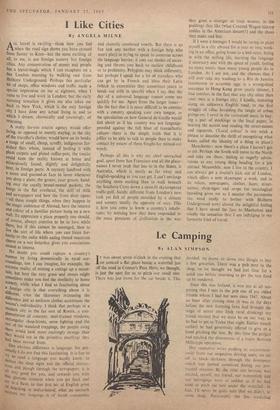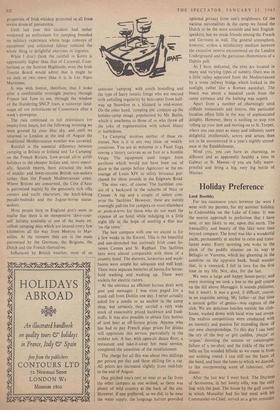Le Camping
By ALAN SIMPSON
IT was about seven o'clock in the evening that we noticed a flat place beside a waterfall just off the road in Connor's Pass. Here, we thought, is just the spot for us to pitch our small tent. There was just room for the car beside it. This decided, we drove on down into Dingle to buy a few groceries. There was a pub next to the shop, so we thought we had just time for a quick one before returning to get the tent fixed up by sundown.
Since this was Ireland, it was not at all sur- prising that I met in the pub one of my oldest friends whom I had not seen since 1947. About an hour after closing time (it was in the days before the new licensing laws had brought the reign of terror into Irish rural drinking) my friend insisted that we must be on our way, as he had to get to Tralee that night. Earlier (much earlier) he had generously offered to give us a hand pitching the tent. By this time the project had reached the dimensions of a major Bertram Mills-type operation.
Our respective wives pushing us unceremoni- ously from our respective driving seats, we set of in black . darkness through the downpour which had started unnoticed during our pro- tracted reunion. By the time our bivouac was erected, myself, my friend, our womenfolk and our belongings were as sodden as if we had tried to pitch the tent under the waterfall—in fact, I'll never be quite sure that we didn't, at some stage. Presumably the fine medicinal properties of Irish whiskey protected us all from severe doses of pneumonia.
Until last year this incident had rather weakened an enthusiasm for camping founded on military experience where large convoys of equipment and unlimited labour reduced the whole thing to delightful exercises in logistics.
While I don't think the .rainfall in Kerry is appreciably higher than that of Cornwall, Cum- berland or the Scottish Highlands, even the Irish Tourist Board would admit that it might be an inch or two more than it is in Les Alpes Maritimes.
It was with horror, therefore, that I woke after a comfortable overnight journey through France last June to see, through the window of the thundering SNCF train, a rainswept land- scape all too reminiscent of Connemara after a week's downpour.
The rain continued to fall relentlessly for twenty-four hours, but the following morning we were greeted by clear blue sky, and until we returned to London at the end of August the traditional Mediterranean weather was unvaried.
Rainfall is the essential difference between camping in Britain or Ireland and 'Le Camping' on the French Riviera. Low-priced all-in airlift holidays to the cheaper Italian and, more especi- ally, Spanish resorts, have attracted the bulk of middle- and lower-income British sun-seekers rather than the French Mediterranean coast. Where Britons are concerned, the COte d'Azur is patronised mainly by the genuinely rich villa owners and yacht charterers, the hitch-hiking pseudo-beatniks and the Jaguar-borne status- seekers.
Most people here in England don't seem to realise that there is an inexpensive 'do-it-your- self' holiday available at one of the many ex- cellent camping sites which are located every few kilometres all the way from Menton to Mar- seilles. At the moment they are in the main patronised by the Germans, the Belgians, the Dutch and the French themselves.
Influenced by British weather, most of us associate 'camping' with youth hostelling and the type of hairy lunatic fringe who are rescued with unfailing regularity by helicopter from•half- way up Snowdon in a blizzard in mid-winter. On the other hand, 'camping site' conjures up the holiday-camp image, popularised by Mr. Butlin, which is anathema to those of us who threw off the yoke of regimentation with school blazer or battledress.
`Le Camping' involves neither of these ex- tremes. Nor is it in any way class- or wealth- conscious. You are as welcome in a Facet Vega towing a luxury caravan as on foot or a humble Vespa. The equipment used ranges from pavilions which would not have been out of place in the camps before Agincourt or the en- tourage of Louis XIV to utility bivouacs pur- chased for three pounds in the Edgware Road.
The sites vary, of course. The humblest con- sist of a backyard in the suburbs of Nice or Cannes A tap and a couple of toilets com- prise the 'facilities.' However, these are merely
• overnight pull-ins for campers en route elsewhere or pieds-d-terre for those who do not want the expense of an hotel while indulging in a little night life in the hope of meeting a film star 'on the town.'
The best compare with one we stayed in for a few weeks in the Estorel. This is the beautiful and sun-drenched but curiously Irish coast be- tween Cannes and St. Raphael. The facilities here were almost comparable with those of a country hotel. The showers, lavatories and wash- basins were simple but adequate and well kept. There were separate batteries of basins for house- hold washing and washing up. There were sockets for electric razors.
At the entrance an efficient bureau dealt with post and messages. I was even paged for a trunk call from Dublin one day. I never actually asked for a needle or an anchor in the camp shop, but certainly they carried a very wide stock of reasonably priced hardware and food- stuffs. It was also possible to obtain litre bottles of iced beer at off-licence prices. Anyone who has had to pay French plage prices for drinks will appreciate this service, particularly in the midday sun. A bar, with open-air dance floor, a restaurant and take-it-away hot meal service, completed the amenities of the establishment.
The charge for all this was about two shillings per person per day and three shilling for a car. All prices are increased slightly from mid-July to the end of August.
One pitched one's tent as near or as far from the other campers as one wished, as there was plenty of wild country at the back of the site. However, if one preferred, as we did, to be near the water supply, the language barrier provided optional privacy from one's neighbours. Of the various nationalities in the camp we found the Dutch to be the most sociable and best English- speakers, but we made friends among the French and Germans as well. The general atmosphere, however, strikes a satisfactory medium between the excessive reserve encountered on the London Underground and the garrulous chumminess of a Dublin pub.
As I have indicated, the sites are located in many and varying types of scenery. Ours was in a little valley separated from the Mediterranean by a stone railway bridge which looked in the sunlight rather like a Roman aqueduct. The beach was about a hundred yards from the camp entrance and the bathing was superb.
Apart from a number of charmingly sited cliffside restaurants and bistros, this particular location offers little in the way of sophisticated delights. However, there is nothing to stop you rolling up your tent and moving on to St. Tropez, where one can meet as many and infinitely more delightful intellectuals,- actors and artists than are to be encountered in a year's nightly attend- ance at the Establishment.
Mind you, you can have as charming, as different and as apparently healthy a time in Galway or St. Mawes—if you are fully water- proofed and bring a big, very big bottle of Man tan.



































 Previous page
Previous page